Sector-specific Cash and Voucher Assistance
CVA can help people in crises address their needs within a specific humanitarian sector, such as water, food, health, shelter, livelihood, or protection. Sector-specific CVA can be restricted or unrestricted, and conditional or unconditional, and will typically be provided as part of a comprehensive package which may also include in-kind and service-based assistance.
Each sector has to consider different questions, challenges, advantages and risks when it comes to supporting people’s recovery within their area of expertise. This requires evidence, tools, guidance and capacity. Meeting sector-specific outcomes through CVA also requires a multi-sectoral understanding of needs and of household economic security – see Multipurpose Cash Assistance. While some sectors are very experienced in implementing CVA and have done so for many years, others are now catching up. Most humanitarian sectors are committed and have been increasing their efforts on sector-specific CVA. The Global Cluster Coordination Group (GCCG) is also coordinating cross-cluster work to improve the sectoral used of CVA.
Current priorities
The CALP Network works closely with the cash technical groups/task teams within the global clusters, who have been defining their 2020 priorities and workplans during their regular meetings. A general overview and specific details of these priorities across each global cluster is available here.
Sector-specific CVA subpages
Camp Coordination, Camp Management and Cash and Voucher Assistance
Page
Find out more about Camp Coordination and Camp Management (CCCM) in relation to Cash and Voucher Assistance (CVA). For the most up to date information visit the Global CCCM Cluster’s website.
Education and Cash and Voucher Assistance
Page
A brief introduction as to how Cash and Voucher Assistance (CVA) can support education outcomes. For the most up to date information please visit the Global Education Cluster’s website.
Food Security and Cash and Voucher Assistance
Page
A brief introduction as to how Cash and Voucher Assistance (CVA) can support food security outcomes. For the most up to date information please visit the Food Security Cluster Cash and Market Working Group web page.
Health and Cash and Voucher Assistance
Page
The content on this webpage has been developed with the Global Health Cluster.
Nutrition and Cash and Voucher Assistance
Page
Malnutrition continues to pose a major challenge to human well-being around the world. In 2020, an estimated 144 million children under five suffer from stunting (i.e. chronic malnutrition) , 47 million children under five were wasted (i.e. acute malnutrition) , of which 14.3 million were severely wasted, and an additional 340 million suffered from micronutrient deficiencies (UNICEF/WHO/WB...
Protection and Cash and Voucher Assistance
Page
How can Cash and Voucher Assistance (CVA) support protection outcomes? Please find a brief summary below, and for the very latest information, refer to the Global Protection Cluster Task Team on Cash for Protection.
Shelter and Cash and Voucher Assistance
Page
How can Cash and Voucher Assistance (CVA) support shelter outcomes? Please find a brief summary below, and for the very latest information, refer to the Shelter and Cash Working Group.
WASH and Cash and Voucher Assistance
Page
How can Cash and Voucher Assistance (CVA) support WASH outcomes? Please find a brief summary below, and for the very latest information, refer to the WASH Cluster’s Cash and Markets Technical Working Group.
Latest

Finding Economic Opportunity in the City: Lessons from IRC’s Cash and Livelihoods Programmes in Cities within Lebanon and Jordan
Report
This report looks at IRC’s experiences in cash assistance and livelihoods programming in Lebanon and Jordan in the context of the Syrian regional response. It explores opportunities and challenges inherent to cash and livelihoods programming, identifying good practices and ways to integrate other...
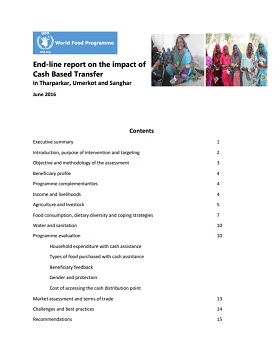
End-line report on the impact of Cash Based Transfer in Tharparkar, Umerkot and Sanghar
Report
The Food for Assets through Cashed Based Transfers was implemented in three drought affected districts of Sindh namely Tharparkar, Umerkot and Sanghar during the period from July 2015 to January 2016 covering 17,000 beneficiaries. The programme engaged beneficiary households in Cash for Training...
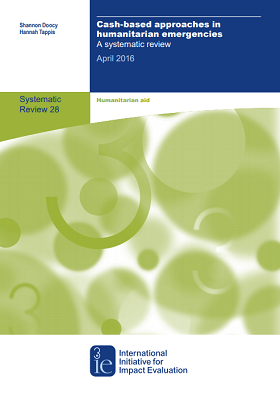
Cash-based approaches in humanitarian emergencies A systematic review. April 2016
Report
Humanitarian actors have a responsibility to ensure that assistance is provided in a way that minimizes risks and maximizes benefits to people affected by crisis. However, there are many challenges in evaluating ‘what works’ in addressing the needs of crisis-affected populations, and translating...
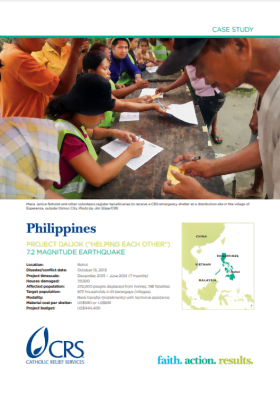
Using Cash for Shelter: Project Daijok ("Helping Each Other")
Case Study
After a major earthquake in the Philippines in October 2013, Catholic Relief Services reached 5,000 families with emergency shelter materials, water and hygiene kits, and emergency latrines. In November 2013, CRS staff conducted a housing and market assessment in three of the worst‑hit municipalities of...

Cash-based programming to address hunger in conflict-affected South Sudan: A case study
Report
For some time aid agencies and donors have recognised the benefits of utilising markets to deliver food assistance. And for almost as long, cash-based programming has been effective in doing this by improving people’s ability to purchase sufficient nutritious food. Addressing hunger through cash...

Literature review on the Use of Cash in Shelter
Report
The Global Shelter Cluster (GSC) with support from UNHCR conducted this literature review of the use of cash in shelter programming to help assess how much documented evidence was currently available from within the sector. The objective of this study is to help better prepare the GSC and its members to...
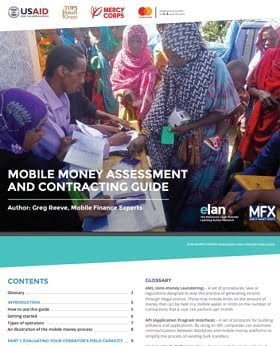
Mobile money assessment and contracting guide
Guidelines and Tools
Mobile money offers tremendous potential to enable cash transfers at scale and connect program participants to financial services. Oftentimes, however, humanitarian practitioners struggle to understand mobile money terminology to confidently evaluate different mobile money operators and to design...

Using Cash for Shelter: An Overview of CRS Programs
Report
Cash continues to gain prevalence as a modality for humanitarian agencies to help people meet multiple and diverse needs in the wake of a crisis. It provides people with the dignity of choice, and is often significantly more cost-efficient than the delivery of in-kind aid. In programs with a shelter...
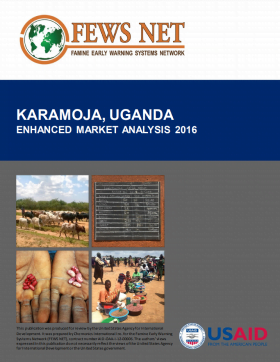
Karamoja, Uganda: Enhanced Market Analysis
Report
The Market Fundamentals reports serves as starting points for providing efficient and effective market-based response decision support for both emergency and development programs in Karamoja Region of Uganda. It examines the appropriateness and feasibility of modality response options for the region.
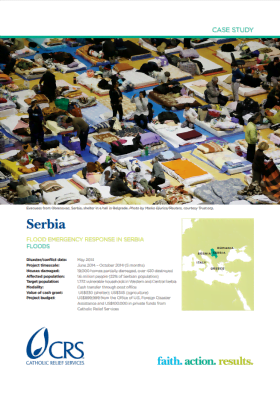
Using Cash for Shelter: Flood Emergency Response in Serbia
Case Study
The devastating floods that affected the Balkans in May 2014 affected 1.6 million people, 22 percent of Serbia’s population, and have set the country’s economic development back decades. Catholic Relief Services (CRS) conducted rapid assessments in 13 villages in the municipalities of Šabac, Valjevo,...

The Politics of Cash: A Case Study on Humanitarian Cash Transfers in Ukraine
Report
This case study examines the evolution of cash transfers in the humanitarian response in Ukraine. The use of cash transfers in Ukraine brought out the best and worst aspects of the international humanitarian system. Uncertainty over where cash fits into the humanitarian architecture – and whether...

Rapid Assessment for Markets: Bidibidi Refugee Settlement
Report
The Rapid Assessment of Markets (RAM) conducted within the Bidibidi Refugee Settlement and in the surrounding Ugandan towns and trading centres sheds some light upon the rapidly developing network of marketplaces within one of the world’s fastest growing refugee settlements. The RAM highligthed key...
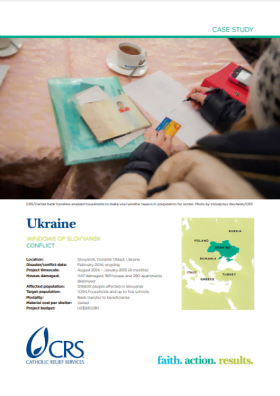
Using Cash for Shelter: Windows of Slovyansk
Case Study
After pro-Russian separatists declared republics in Eastern Ukraine in April 2014, Slovyansk became a focal point of fighting between government forces and rebels until the Ukrainian military retook the city in early July. Slovyansk saw the heaviest fighting of any urban area and many city dwellers fled....

Scaling Up Humanitarian Cash Transfers in Nepal
Case Study
The Nepal earthquake has a number of lessons for the global debates on scaling up cash both at the level of cash responses themselves and in the more transformational way envisaged by the High Level Panel through which cash can disrupt the established humanitarian system. Humanitarian cash transfers after...
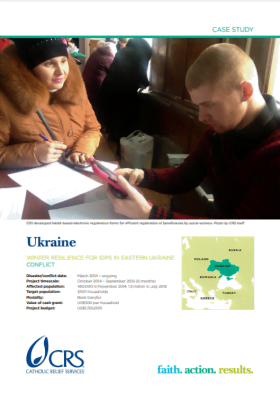
Using Cash for Shelter: Winter Resilience for IDPs in Eastern Ukraine
Case Study
Continued conflict in Eastern Ukraine during 2014 caused internal displacement of over 1.46 million people by September 2015, and another 1,123,800 fled to other countries, according to the United Nations High Commissioner for Refugees. Rapid assessments carried out by Catholic Relief Services found that...

Baseline Assessment for Education Cash Transfer Programming for IDPS in Dahuk Governance
Report
REACH, in collaboration with UNICEF, conducted a Baseline Assessment of Access to Education among Internally Displaced Persons in the Dahuk Governorate of Iraq. This assessment aimed to improve the efficiency of humanitarian cash assistance by implementing partners for increased access to education in the...

Using Cash for Shelter: Rent Assistance for Syrian Refugees
Case Study
Over 600,000 Syrian refugees have arrived in Jordan since 2011; 80 percent of these live in urban or peri-urban locations rather than in camp settings. Families in this situation must pay rent for their shelter, and are therefore subject to shifts in rental market values. Rents have inflated substantially...
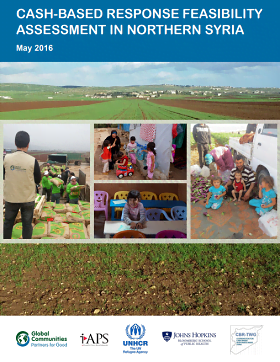
Cash-based Response Feasibility Assessment in Northern Syria
Case Study
As the conflict in Syria extends beyond the fourth year, there is need for a widespread humanitarian response focused on urban areas that addresses humanitarian needs and promotes resilience for the 13.5 million people in need of protection and humanitarian assistance within Syria. The majority of...
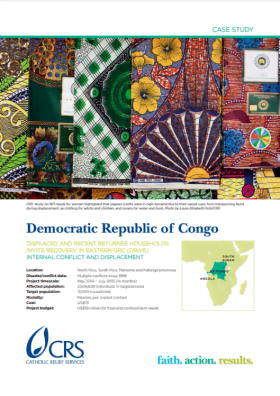
Using Cash for Shelter: Displaced and Recent Returnee Households Invite Recovery in Eastern DRC (DRIVE) Internal Conflict and Displacement
Case Study
The Democratic Republic of Congo, or DRC, has endured multiple conflicts since 1996, including armed conflict in Eastern DRC in 2012 and 2013. In December 2014, the United Nations Office for the Coordination of Humanitarian Affairs in the DRC reported that the armed conflict had internally displaced 2.72...
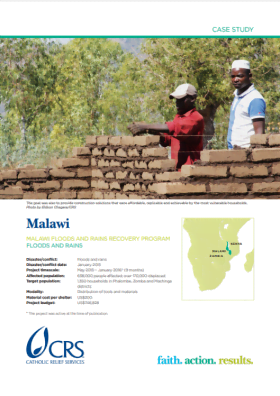
Using Cash for Shelter: Malawi Floods and Rains Recovery Program
Case Study
In January 2015, heavy rainstorms and floods affected 630,000 people in Malawi. Protracted immersion or flow of water damaged or destroyed dwellings and displaced over 170,000 people, with timber and roofing material also lost to the floods. Catholic Relief Services conducted a physical survey of...


